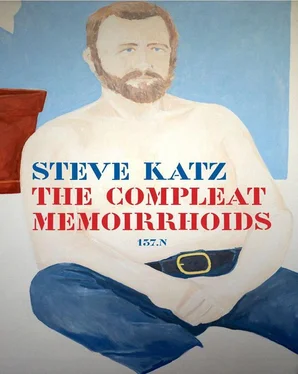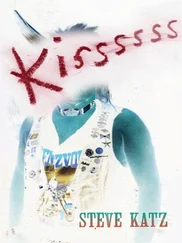and only the fact of her husband & four other people
kept me from springing on her
or falling at her little feet and crying
‘You are the hottest one for years of night
Henry’s dazed eyes
have enjoyed, Brilliance.’ I advanced upon
(despairing) my spumoni. — Sir Bones: is stuffed
de world, wif feeding girls.
— Black hair, complexion Latin, jeweled eyes
downcast…The slob beside her feasts…What wonders is
she sitting on, over there?
The restaurant buzzes. She might as well be on Mars.
Where did it all go wrong? There ought to be a law against Henry.
— Mr. Bones: there is.
Though the Dream Songs are stylized, stagy as a minstrel show, they were just what I needed to refresh my love for American idiom. We’d been living in Italy for almost three years. I understood that as a great privilege. I loved Italy, but I felt my grip on present usage in the American language slipping. We were ready to go back. My oldest son, Avrum, who was four, spoke Italian, the Leccese dialect (we’d lived in Lecce for a year) and the Veronese dialect, as well as English. I knew he risked losing that, and Nikolai, two years old, could lose his Italian smatter.
We returned to Ithaca, New York. Baxter Hathaway had arranged for me to teach at Cornell. That was a stroke of luck, and expression of his faith in me I will always cherish. I didn’t want to teach. I never really loved school, and understood the precept that “them that teach don’t do”; on the other hand, I didn’t relish the idea of hauling my family, which had swelled to three sons, back to the US with no job. We arrived in Ithaca, New York, myself packing my passion for John Berryman and his quirky Dream Song project.
“God bless Henry. He lived like a rat.”
“You’ll get to appreciate the wide palette of grays of the Ithaca skies,” Baxter said. He was founder of the Cornell Creative Writing Program, founder of Epoch magazine, a brilliant man of real integrity and compassion, the avuncular mentor of young writers at Cornell. He was always ready to take a cup of coffee with his protégés at Noyes Lodge, or Willard Straight Hall. Slow of speech, and laconic, perpetually drawing on a cigarette, he would listen for hours to amateur literary talk. He bristled against the dominance of the Iowa Writer’s Workshop. I’d be curious to know what he’d think of the present plague of writer’s workshops in America. I can’t honestly complain, however. Because of that expansion, I was able to make a living.
As a Cornell Prof I pushed to get John Berryman into town for a reading. It worked. I was put in charge of the event. The poet arrived at the Ithaca airport in the early afternoon, and was scheduled to read in the evening. He was staying at our apartment. Jingle and I cleaned thoroughly to make it nice for the great poet. The Ithaca airport had no gates. An eminence could descend the stairs as a President would, waving at the crowd. The poet appeared at the door supported under the arms by a flight attendant and the co-pilot. He was totally sloshed, the kind of drunk you have to prop up while he takes a piss. No one had explained to me that Berryman was a hopeless alcoholic; in fact, he wrote most of a novel, Recovery, about the disease of alcoholism. On my first encounter with him, he stank. He had pissed himself in flight. His suit was soaked. The cabin of the plane must have reeked of him. Behind his disheveled graying beard, his unkempt hair, his expression was that of a frightened POW. I introduced myself, but I don’t think it registered. I could feel his panic. He babbled incoherently, this shaper of some of the most muscular lines in the American language.
“I’m scared a lonely. Never see my son
easy be not to see anyone,
combers out to sea
know they’re going somewhere but not me.
Got a little poison, got a little gun,
I’m scared a lonely.
Someone helped me pile him onto the bench of our VW Microbus. The car smelled of him for weeks. He slumped over on me, babbling in a kind of frothy hysteria, as I drove him home. Jingle seemed to be the tranquilizer he needed. He calmed down as soon as he saw her. He took her hand, and walked up the eight steps to our apartment under his own power. “He probably needs to sleep,” said Jingle, with basic Winnemucca wisdom. I was nearly hysterical myself, wouldn’t have come up with that idea.
We woke him an hour before the reading. He had pissed in his sleep, and the wet spot had drawn purple dye from the cushions onto the white sheet. He was used to this drill. In his suitcase, along with his poems, he carried clean underwear and a fresh suit. He washed up, and we headed for the reading, the poet grabbing Jingle’s hand on the way. He didn’t let go of it till after I introduced him and he climbed to the podium. He read pretty well, from Homage To Mistress Bradstreet , and The Dream Songs , but not with the minstrel show panache that the poems promise, that I had hoped for. We didn’t exchange more than three or four sentences. He was sequestered deep within himself. I wouldn’t suggest a drink. He wanted to sleep. The following morning he met a workshop, and several of the young women there perked him up. A later dream song is dedicated to Amy Vladeck, a student he met at the workshop. He probably never even registered my name. Berryman left on a flight before noon. He was sober. I’m sorry I didn’t get him to sign the sheet he had stained. We kept it for a long time flying on the clothesline — Henry’s banner, the flag of Mr. Bones.
Supreme my holdings, greater yet my need,
thoughtless I go out. Dawn. Have I my cig’s,
my flaskie O,
O crystal cock, — my kneel has gone to seed,—
and anybody’s blessing? (Blast the MIGs
for making fumble so
my tardy readying.) Yes, utter’ that,
Anybody’s blessing? — Mr. Bones,
you makes too much
demand. I might be ‘fording you a hat:
it gonna rain. — I knew a one of groans
& greed & spite, of a crutch
who had thought he had, a vile night, been — well — blest.
He see someone run off. Why not Henry,
With his grasp of desire?
— Hear matters hard to manage at de best,
Mr Bones. Tween what we see, what be,
is blinds. Them blinds’ on fire.
Max’s Kansas City, opened in 1965 by Mickey Ruskin, was the scene, the gathering place for Warhol’s factory people, and the art glitterati. At this hotspot present and future stars of the art and pop world like Janis Joplin, Lou Reed, Iggy Pop, David Bowie, Mel Brooks, Larry Rivers, Richie Havens, Abby Hoffman, Lawrence Weiner, Cary Grant, Patti Smith, Jane Fonda, Jim Morrison, Germaine Greer, Mick Jagger, and et cetera, saw each other and showed up to be seen. They chewed the fat there. They displayed and mated. Jimi Hendrix called it the place where you could “let your freak flag fly.”
Less well known was St. Adrian’s, named for the famous group portrait of opulent burghers painted by Rembrandt. It was two dark rooms on the ground floor of the old Broadway Central Hotel, on Broadway, at the dead end of Great Jones Street. It later morphed into a notorious welfare hotel/drug market, and then was devoured by the New York University real estate beast. On the wall by the bar hung a huge reproduction of the great Dutchman’s The St. Adrian Holding Company, a celebration of Netherlands’ wealthy. If Max’s was a social scene and an endless party, St. Adrian’s was the “think tank” of the art scene. The future art world head-liners talked about books they were reading, films they had seen or were making. They strategized their moves in the gallery and art world over vodka and beer. I read there a couple of times from a new book, Saw , published by Knopf. At one table the avuncular Karl Andre might be pontificating about the de-commoditization of art, and at another an assembly of Mike Heizer, Walter DeMaria, Nancy Graves, Charles Ross, Brice Marden, by their very presence together in conversation would be destroying the limitations of the pedestal for sculpture, and wiping out the constrictions of the frame in painting. Art was expansive as America, even within the heady confines of St. Adrian’s. Installations, earth art, performance, were all being born at these tables. Listening to these artists was exhilarating for me. I stretched my brain trying to figure what the analogous moves were in the art of writing. These visual artists seemed more articulate about aesthetics and politics and art history than the writers I partied with, including myself, who were so careful about how they framed their sentences that it took them a long time to say very little. One evening I was sitting with Nancy Graves, Steve Reich, Michael Heizer and Richard Serra and others. Richard said, “Next year I’ll make my move.” He stared down at the table. “I’ll be ready to take over the art world.” That revelation of raw ambition spun me around. Who is this? Who thinks this way? I never had thoughts of taking over anything. I just wanted to grow my work, make it richer, and push it to embrace more of the world. But Richard is a powerful talent, a huge intelligence, and a limitless ambition. He grew his work, made it richer, and no one who was in New York for his immense MOMA show can argue that he didn’t take over the art world. It was as if the art powers were overcompensating for having violated and removed his “Tilted Arc.” Banners advertising his work hung from lampposts all over the city. Double page photo ads of his huge Core-ten steel curlicues installed on the ground floor of the MOMA appeared in double page spreads in the NY Times and the New Yorker . It was like a knockout in the heavyweight division. For the duration of this show the possibility of thinking of any other artist was virtually obliterated.
Читать дальше












